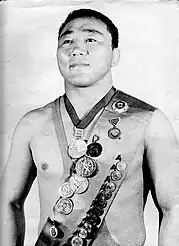 | ||
| Medal record | ||
|---|---|---|
| Men's Freestyle Wrestling | ||
| Representing | ||
| Olympic Games | ||
| 1968 Mexico City | Middleweight | |
| World Championships | ||
| 1967 New Delhi | 87 kg | |
Jigjidiin Mönkhbat (Mongolian: Жигжидийн Мөнхбат; 1 June 1941 – 9 April 2018) was a Mongolian wrestler. At the 1967 World Wrestling Championships Jigjidiin Mönkhbat held a bronze medal after defeating the Olympic champion Hasan Güngör. At the 1968 Summer Olympics he won the silver medal in the men's Freestyle Middleweight category (87 kg), behind gold medalist Boris Michail Gurevich of the Soviet Union and ahead of bronze medalist Prodan Gardzhev of Bulgaria.[1] His results in the Olympics were 4 wins, 2 draws, and 0 losses.
| Round | Opponent | Сountry | Results | Penalties | Time |
|---|---|---|---|---|---|
| 1 | Peter Döring | Won by Points | 1 | ||
| 2 | Raúl García | Won by Fall (TF) | 0 | (1:17) | |
| 3 | Jean-Marie Chardonnens | Won by Technical Superiority | 0,5 | ||
| 4 | Bye | 0 | |||
| 5 | Prodan Gardzhev | Draw | 2 | ||
| 6 | Boris Gurevich | Draw | 2 | ||
| 7 | Tom Peckham | Won by Points | 1 | ||
Mönkhbat was a Titan in Mongolian wrestling, a top rank in the sport, with six Naadam championship wins (1963–1967, 1974). He won five tournaments in a row, a feat achieved by only two other athletes in the modern history of Mongolian wrestling (since 1922). His name Mönkhbat means "Eternal firm" in the Mongolian language.
He was the father of professional sumo wrestler Hakuhō Shō, who held the top rank of yokozuna in that sport before retiring. His son Hakuhō regards his six Nadaam championships as the equivalent of 36 tournament championships in sumo (as sumo tournaments are held six times a year) and used that as motivation to keep going even after passing Taihō's record of 32 championships.[2]
References
- ↑ "Wrestling at the 1968 Ciudad de México Summer Games: Men's Middleweight, Freestyle". Sports-reference.com. Archived from the original on 9 November 2012. Retrieved 25 October 2011.
- ↑ Gunning, John (31 May 2017). "Takayasu's rise built on solid family support". Japan Times. Retrieved 1 June 2017.
External links
- Jigjidiin Mönkhbat at the International Wrestling Database
- Jigjidiin Mönkhbat at Olympics.com
- Jigjidiin Mönkhbat at Olympedia